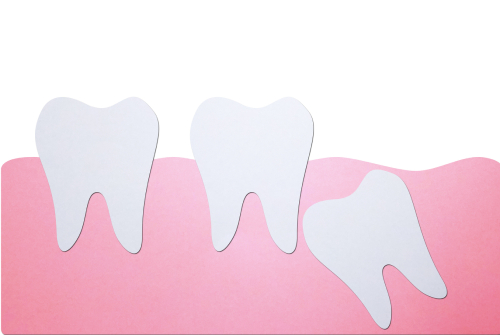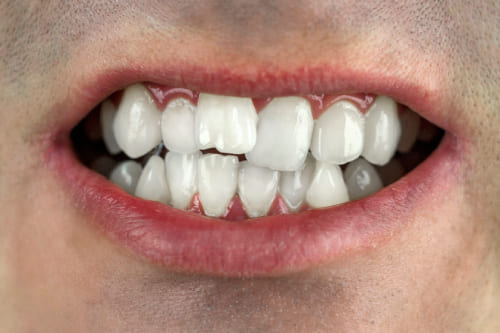Navigation
Can wisdom teeth make your teeth crooked?
Wisdom teeth are said to appear when you’re older and – as the name suggests – hopefully a little wiser. However, for many of us they’re often unnecessary and when they finally make their presence known, there’s not always enough space.
Why do we have wisdom teeth?
Scientists have discovered that our early ancestors would have used their wisdom teeth much more than we need to today. They would have replaced teeth lost through trauma and decay, and the prehistoric diet and lifestyle would have required a broader jaw for chewing rougher, coarser food.
Today, of course, wisdom teeth aren’t nearly as welcome. Thanks to softer diets, improved dental care and shrinking jaws, squeezing in these extra teeth can cause an array of problems and often mild-to-severe discomfort.
When your wisdom teeth eventually break through, they can sometimes get stuck. This is known as the tooth being impacted, and a fully impacted wisdom tooth will remain completely hidden beneath the gums. Partially impacted wisdom teeth will peek through the gums, meaning they can be glimpsed at the back of the mouth.

Do impacted wisdom teeth need to be removed?
Impacted wisdom teeth don’t necessarily need to be removed, and some will sit there causing no problems whatsoever. But in some cases, bacteria can build up around impacted teeth. This can lead to decay, gum disease and in some cases infections and abscesses, which can cause a lot of discomfort and require attention from your dentist.
People struggling with complications caused by impacted wisdom teeth will likely be recommended a course of treatment, and your dentist may decide to remove the wisdom teeth altogether. Wisdom tooth removal is a very common procedure and generally very straightforward, and your dentist will be able to explain how best to maintain your oral health following the extraction.

Are my wisdom teeth making my other teeth crooked?
It’s a common misconception that wisdom teeth cause your other teeth to overlap or become crooked. Extensive studies have been undertaken to understand how wisdom teeth affect the position of other teeth, revealing that wisdom teeth do not exert enough pressure to cause crowding or crookedness.
As such, if you’re experiencing crowded or crooked teeth, your wisdom teeth are most likely not to blame. If you’re worried about crooked teeth affecting your smile, it’s always a good idea to speak to your dentist or book an appointment with an orthodontist, who will be able to recommend the best braces or treatments for you.
However, if it is your wisdom teeth that are causing you trouble, you’ll need to book an appointment with your general dentist.
At Total Orthodontics, we’re here to help you achieve the smile you’ve always wanted. Get in touch today and see what our expert team can do for you.